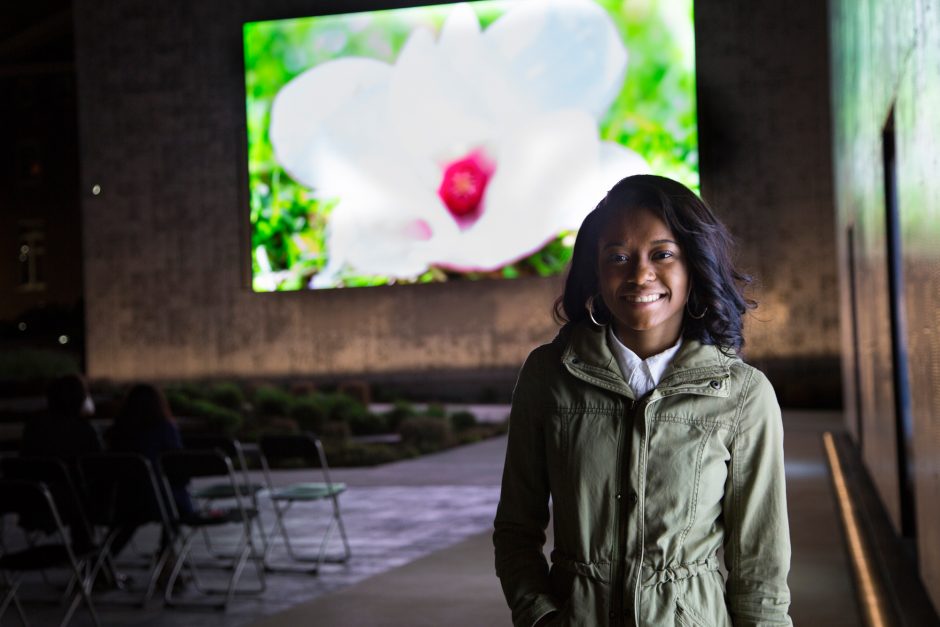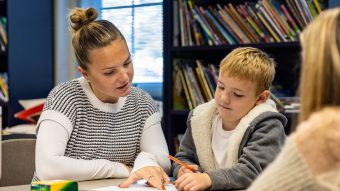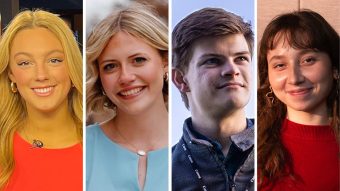
When she was 10 years old, Eryn Harris and her family visited an aquarium while on a trip to Atlanta. Harris asked to borrow her mother’s camera to photograph the jellyfish. She was immediately fascinated with the camera. That allure continues today as she pursues a digital storytelling degree at Mizzou.
Digital storytelling is one of MU’s newest programs. In 2012, a collaborate group of faculty from areas including English, communication, journalism and film studies began a push to bring a digital storytelling major to Mizzou. A steering committee led by Associate Professor of English Joanna Hearne was created in fall 2014, and a proposal was approved in April 2015.
“While many universities offer courses in audio-video production, radically few offer students the opportunity to think and write deeply and critically — and at length — on the subject of digital storytelling, which involves a broader range of digital media forms: animation, podcasting, creative writing for social media platforms and more,” Hearne says. “Fewer combine scholarship in this area with creative practice.”
Digital storytelling offered its first core courses in fall 2015, and since that time, 71 students have declared digital storytelling as their major.
Major changes
Harris did not intend to major in digital storytelling when she came to Mizzou. Instead, she planned to follow in her father’s footsteps by pursuing a business marketing degree. While growing up in Florissant, Missouri, Harris admired her father’s work as a sales manager for Pepsi, Dr Pepper and Snapple.
“I wanted to do what he did,” she says.
Her first semester at MU consisted mostly of math and economics courses, as is usual for a business marketing major. While exploring elective course possibilities to take in the spring semester of her freshman year, Harris came across a digital production class taught by Katina Bitsicas.
“As soon as I saw that, I knew I wanted to try that class out,” Harris says.
She took the class, liked it and then enrolled in the advanced digital production course. Harris soon realized it was time to switch majors.
“I found something I love,” she says. “I am excited for each class to learn something new and to work on my projects.”
Body work
The first project Harris worked on as part of her new major was a piece she titled “This is Me.” In the video, nine women speak candidly about insecurities they have had about their bodies.
"My goal is to give a new meaning to self-worth, self-love and being a woman."
- Digital storyteller Eryn Harris
“I’m big in promoting the idea of loving yourself,” Harris says. “In order to love yourself, you also have to appreciate your flaws. All of these girls share their stories about how they went through different insecurities.”
In the video, all nine women remain on screen — in nine separate boxes — throughout the video, each taking her turn describing insecurities she has experienced. “I wanted to portray it as the ladies were listening to each other,” Harris explains.
“The viewer is able to connect with the honest statements the women make on screen,” says Bitsicas, who was one of the first digital storytelling faculty hired, along with Joseph Erb, in 2015. “Eryn’s use of timing in the work, where a conversation between the women forms on screen, allows a place for the viewer to insert themselves into the work.”
Harris found it surprisingly easy to get the women to speak about their insecurities on camera. “I’m very persuasive,” she says.
At the end of the piece, the tone shifts as one of the women talks about all of the things she loves about herself. “I am so uniquely and marvelously made in God’s eyes,” the woman says, “and that’s how it’s supposed to be.”
Harris entered “This is Me” into the Rewriting Realities contest, sponsored by the Multicultural Certificate, and won first place in the digital storytelling category.
Poetry in motion
Another project of Harris’ titled “My Queen” is a narration of a poem. In “My Queen” a woman is shown on screen throughout the piece while a man’s voice is heard reading the poem, which was written by recent Mizzou alumnus Wycla Bratton.
“It's the opposite of my first piece,” Harris says. “It shines a light on the African American woman and shows how valued, appreciated and cherished she truly is. It is a man appreciating a woman, not just for her looks but for the way she carries herself and the things that she inspired him to do.”
The poem ends: “It is her. My friend, my world, my queen.”
Harris’ best asset, according to Bitsicas, is the ability to take an idea and translate it into a visual work in multiple media.
“She doesn’t think of her ideas in a cut and dry fashion,” Bitsicas says, “but rather is open to exploring multiple facets of her ideas. She isn’t afraid to explore the tough concepts and make the viewer think about the issue in a new way.”
Harris’ stories come from what she finds important to her as a young woman.
“I like to address things that aren't normally addressed in everyday life, whether that is stereotypes or insecurities,” she says. “I'm inspired by your everyday hard-working woman, who is often overlooked or torn down by others. My goal is to give a new meaning to self-worth, self-love and being a woman.”



